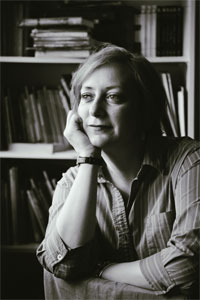Two Paths to Social Justice - The Making of a Teacher
Two years ago, when he was leading a wilderness trip for Outward Bound, Alex Elson met Willy, a bright seventeen-year-old who couldn't read. The system had failed him, and I wondered,"What good was I doing?, Alex recalls. Five months later, Alex joined the Social Studies Program at Teachers College. Janeen Richards, 41, had always dreamed of becoming a history teacher, but faced with a tough job market after college, she'd taken her advisor's suggestion and gone to pharmacy school instead. Finally, after 14 years of filling prescriptions in Seattle, Janeen sold her house and car and headed off to Teachers College to join the Social Studies Program.
Two years ago, when he was leading a wilderness trip for Outward Bound, Alex Elson met Willy, a bright seventeen-year-old who couldn't read.
"The system had failed him, and I wondered, 'What good was I doing?'" Alex recalls. Five months later, Alex joined the Social Studies Program at Teachers College.
Janeen Richards, 41, had always dreamed of becoming a history teacher, but faced with a tough job market after college, she'd taken her advisor's suggestion and gone to pharmacy school instead. Finally, after 14 years of filling prescriptions in Seattle, Janeen sold her house and car and headed off to Teachers College to join the Social Studies Program.
Social studies at TC draws students from a wide range of backgrounds and prepares them to teach a variety of subjects, including history, political science, geography, economics and civics. Yet if there is a common thread that unites students, it's their heightened idealism and desire to change the world.
"Social justice is at the heart of our program," says Margaret Crocco, Associate Professor of Social Studies and Education. Nowhere does that focus play out more significantly than in the two full semesters of student teaching TC requires of its pre-service social studies teachers. It's an experience TC students often find tests their idealism - and, some believe, the College's.
For Alex, 26, Humanities Preparatory Academy, a small high school in lower Manhattan, offered a good fit. He describes it as "a haven for students who have previously experienced school as unresponsive to their needs"- a place where faculty and students are on a first-name basis and share a communal lounge. The student body is diverse, and the school's philosophy is to create a "progressive democratic community." Despite their earlier difficulties, most of the students end up going to college.
During spring semester, Alex taught European history, focusing on Enlightenment-era political philosophers. The students debated the finer points of Montesquieu's views on the separation of powers and Wollstonecraft's advocacy for women's education. Posters on the classroom walls blared slogans like "Practices Oppressive to Women" and "Hatching Hierarchies."
"Humanities Prep really reflected my commitment to social justice," Alex says. Still, his perception is that TC sometimes falls short of that mark with its field placements. "Here we are with this mission of educational equity, but I don't see that many of our student teachers are going into high-needs or poor-performing schools."
Crocco says that's simply not so. "Most of our student teachers are in high-needs schools of one degree or another," she says. "Wherever they do their student teaching, we ensure that teachers work with a diverse student body. But we don't put our students into the worst-performing schools because we don't think chaotic environments provide good spaces for learning to teach."
It wasn't always clear to Janeen this past year that she would find that proverbial "good space." After spending her first semester in the field at Anderson, an accelerated middle school on Manhattan's Upper West Side, Janeen headed off to a predominantly African-American high school in Harlem. The next six weeks tested her classroom philosophies, her personal resilience and ultimately, her commitment to teaching.
"The school was highly regimented," she says. "Teachers were yelling and very confrontational with students." Students were often hostile in return, particularly toward the more soft-spoken teachers.
"It was so disheartening to plan lessons and teach when students refused to participate and complete their homework," Janeen says. "And the other teachers just talked about how the students were failing, as if they'd given up on them."
The last straw for Janeen came one morning when the school principal asked her where her egg timer was. The question wasn't metaphorical: other teachers really did use egg timers to enforce the school's policy of strictly-timed lessons.
"I am not cooking an egg," Janeen says, her indignation still evident. "Each student learns at a different pace, and I need to ensure that I am meeting every student's needs. Instead, the structure of the school seemed set up to have them - and me - fail."
On a visit she made to Alex's class at Humanities Prep, Janeen saw "this great rapport between students and teachers." She realized that "teaching in Harlem was not the be-all and end-all - there were other scenarios of what successful inner-city school teaching could look like." She decided to leave her own placement--a rare occurrence at TC--and return to Anderson.
She closed out the spring leading her Anderson class through an examination of the causes of the American Revolution. The students presented their research on Washington, Franklin and Hamilton from their laptops, while Janeen's mentor teacher, Michelle Sufrin, contributed an occasional question or suggestion.
"'Am I copping out?'" Janeen says she repeatedly asked herself. "I would feel horrible if I only wanted to work with gifted students. I wanted to teach in an urban high school, but if you are in horrible school, then how can you become a better teacher?"
Published Monday, Nov. 21, 2005

